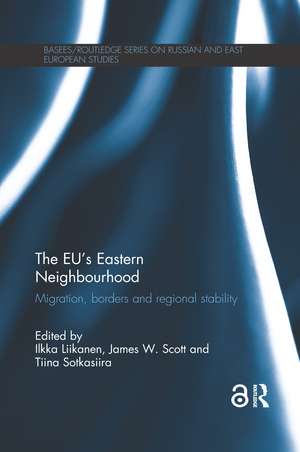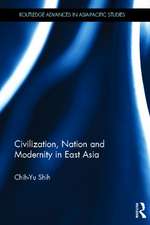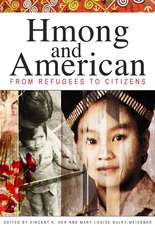The EU's Eastern Neighbourhood: Migration, Borders and Regional Stability: BASEES/Routledge Series on Russian and East European Studies
Editat de Ilkka Liikanen, James W. Scott, Tiina Sotkasiiraen Limba Engleză Paperback – 12 ian 2018
The Open Access version of this book, available at http://www.taylorfrancis.com, has been made available under a Creative Commons Attribution-Non Commercial-No Derivatives 4.0 license.
| Toate formatele și edițiile | Preț | Express |
|---|---|---|
| Paperback (1) | 284.52 lei 6-8 săpt. | |
| Taylor & Francis – 12 ian 2018 | 284.52 lei 6-8 săpt. | |
| Hardback (1) | 543.93 lei 6-8 săpt. | |
| Taylor & Francis – 9 iun 2016 | 543.93 lei 6-8 săpt. |
Din seria BASEES/Routledge Series on Russian and East European Studies
-
 Preț: 309.89 lei
Preț: 309.89 lei -
 Preț: 737.40 lei
Preț: 737.40 lei -
 Preț: 341.55 lei
Preț: 341.55 lei -
 Preț: 297.39 lei
Preț: 297.39 lei -
 Preț: 228.19 lei
Preț: 228.19 lei -
 Preț: 310.85 lei
Preț: 310.85 lei -
 Preț: 311.22 lei
Preț: 311.22 lei -
 Preț: 310.22 lei
Preț: 310.22 lei -
 Preț: 326.49 lei
Preț: 326.49 lei -
 Preț: 641.88 lei
Preț: 641.88 lei - 8%
 Preț: 382.69 lei
Preț: 382.69 lei -
 Preț: 199.46 lei
Preț: 199.46 lei - 9%
 Preț: 1039.42 lei
Preț: 1039.42 lei -
 Preț: 398.18 lei
Preț: 398.18 lei - 18%
 Preț: 1271.75 lei
Preț: 1271.75 lei - 22%
 Preț: 298.10 lei
Preț: 298.10 lei - 18%
 Preț: 1059.84 lei
Preț: 1059.84 lei - 18%
 Preț: 1057.05 lei
Preț: 1057.05 lei - 18%
 Preț: 1062.26 lei
Preț: 1062.26 lei - 18%
 Preț: 1055.51 lei
Preț: 1055.51 lei - 18%
 Preț: 1057.75 lei
Preț: 1057.75 lei - 18%
 Preț: 1059.84 lei
Preț: 1059.84 lei - 25%
 Preț: 823.63 lei
Preț: 823.63 lei -
 Preț: 490.25 lei
Preț: 490.25 lei - 18%
 Preț: 1005.39 lei
Preț: 1005.39 lei - 18%
 Preț: 1000.27 lei
Preț: 1000.27 lei - 8%
 Preț: 383.73 lei
Preț: 383.73 lei - 18%
 Preț: 1059.84 lei
Preț: 1059.84 lei - 18%
 Preț: 1009.21 lei
Preț: 1009.21 lei - 18%
 Preț: 1059.84 lei
Preț: 1059.84 lei - 18%
 Preț: 1167.36 lei
Preț: 1167.36 lei - 25%
 Preț: 771.71 lei
Preț: 771.71 lei - 18%
 Preț: 1059.84 lei
Preț: 1059.84 lei - 18%
 Preț: 1004.20 lei
Preț: 1004.20 lei - 18%
 Preț: 1053.92 lei
Preț: 1053.92 lei - 25%
 Preț: 515.72 lei
Preț: 515.72 lei - 18%
 Preț: 709.01 lei
Preț: 709.01 lei - 25%
 Preț: 823.08 lei
Preț: 823.08 lei - 18%
 Preț: 1112.90 lei
Preț: 1112.90 lei - 18%
 Preț: 1057.75 lei
Preț: 1057.75 lei - 18%
 Preț: 1065.75 lei
Preț: 1065.75 lei - 18%
 Preț: 1055.51 lei
Preț: 1055.51 lei - 26%
 Preț: 850.73 lei
Preț: 850.73 lei - 18%
 Preț: 1059.84 lei
Preț: 1059.84 lei - 25%
 Preț: 825.06 lei
Preț: 825.06 lei - 18%
 Preț: 734.50 lei
Preț: 734.50 lei
Preț: 284.52 lei
Nou
Puncte Express: 427
Preț estimativ în valută:
54.45€ • 56.92$ • 46.01£
54.45€ • 56.92$ • 46.01£
Carte tipărită la comandă
Livrare economică 07-21 martie
Preluare comenzi: 021 569.72.76
Specificații
ISBN-13: 9781138477698
ISBN-10: 1138477699
Pagini: 318
Ilustrații: 3 Line drawings, black and white; 2 Halftones, black and white; 11 Tables, black and white; 5 Illustrations, black and white
Dimensiuni: 156 x 234 x 17 mm
Greutate: 0.45 kg
Ediția:1
Editura: Taylor & Francis
Colecția Routledge
Seria BASEES/Routledge Series on Russian and East European Studies
Locul publicării:Oxford, United Kingdom
ISBN-10: 1138477699
Pagini: 318
Ilustrații: 3 Line drawings, black and white; 2 Halftones, black and white; 11 Tables, black and white; 5 Illustrations, black and white
Dimensiuni: 156 x 234 x 17 mm
Greutate: 0.45 kg
Ediția:1
Editura: Taylor & Francis
Colecția Routledge
Seria BASEES/Routledge Series on Russian and East European Studies
Locul publicării:Oxford, United Kingdom
Public țintă
Postgraduate and UndergraduateCuprins
Introduction: The End of Wider Europe? Part One. Renegotiating Borders in the Post-Soviet Space 1. Building Regional Stability Through Cross-Border Cooperation 2. Ukraine: History Confronts Geography 3. Borders and Nation-Building in Post-Soviet Space 4. Reconceptualisations of Borders in Post-Soviet Ukraine Part Two: Border Management and Cross-Border Cooperation 5. Eastern Neighbourhood as a Political Divide Chapter 6. Bordering in Post-Soviet Central Asia 7. Of Barriers, Breaches and Bridges Part Three: Migration Policies 8. Where Ideals and Anxieties Meet 9. The New Concept of Migration Policy of the Russian Federation 10. The Republic of Belarus: Flows and Tendencies in Migration Processes 11. What Kind of Choice? Understanding Migration in Tajikistan Part Four: Migration and the Everyday 12. Labour Migration and the Contradictory Logic of Integration in Russia 13. Colonial Imagination on a Postcolonial Periphery 14. Gendered Migration from Moldova and Ukraine to the EU: Who Cares? 15. Contemporary Ukrainian Migration to EU Countries: Trends and Challenges Conclusion: The European Union, Partnerships and Neighbourhoods
Notă biografică
Ilkka Liikanen is a Professor at the Karelian Institute, University of Eastern Finland
James W. Scott is Research Professor of Regional and Border Studies at the University of Eastern Finland and Associate Professor of Geography at the Free University of Berlin
Tiina Sotkasiira is a researcher at the Karelian Institute, University of Eastern Finland
James W. Scott is Research Professor of Regional and Border Studies at the University of Eastern Finland and Associate Professor of Geography at the Free University of Berlin
Tiina Sotkasiira is a researcher at the Karelian Institute, University of Eastern Finland
Descriere
The Soviet Union's collapse has had long-lasting impacts on Eastern Europe, the South Caucasus and Central Asia: changes in state-society relations, reconfiguration of political, economic and social ties, resurgence of regional conflicts, and new migration patterns towards Russia and the European Union. Meanwhile, the EU has emerged as an important regional player, engaging neighbouring states in cross-border regional co-operation. This book explores questions related to borders, security and migration in the emerging "European Neighbourhood", and the potential role of the EU as a stabilizing force.

















